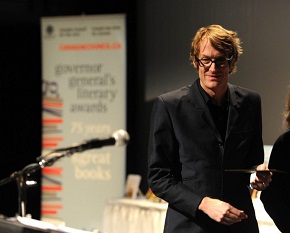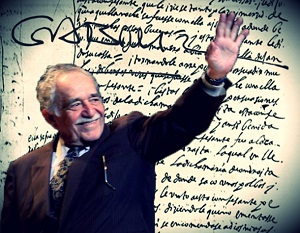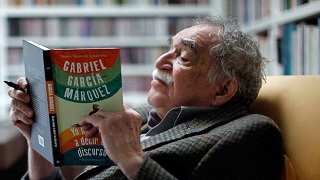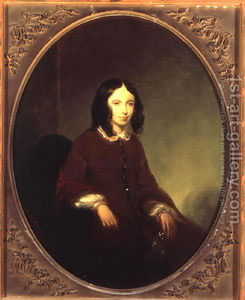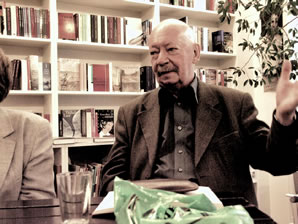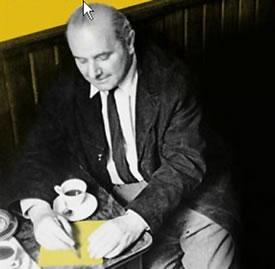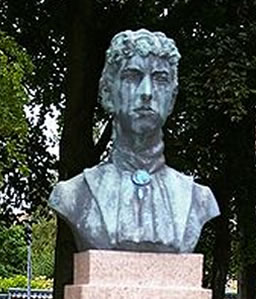De Colombiaanse schrijver Gabriel García Márquez werd op 6 maart 1928 in de kustplaats Aracataca geboren. Zie ook mijn blog van 6 maart 2007 en ook mijn blog van 6 maart 2008.
Uit: Over de liefde en andere duivels (Vertaald door Adri Boon)
Zij denkt dat u edelen in een val van Satan zijn gelopen,’ zei de onderkoning.
Niet alleen wij, maar heel Spanje zei de bisschop. ‘We zijn de oceaan overgestoken om de leer van Christus te verbreiden, en daar zijn we in geslaagd voor zover het missen, processies en patroonsfeesten betreft, maar niet waar de ziel in het geding is’.
Hij sprak over Yucatán. waar weelderige karhedralen waren verrezen om de heidense piramiden aan het oog te onttrekken, zonder dat men er bij stil stond dat de inheemse bevolking naar de mis ging omdat hun heiligdommen onder de zilveren altaren bleven voortleven. Hij sprak over de rassenvermenging die ze hadden veroorzaakt sinds de verovering: Spaans bloed met indiaans bloed, Spaans en indiaans bloed met dat van allerlei soorten negers, tot aan West-Soedanese mohammedanen aan toe, en hij vroeg zich af of er wil plaats was in Gods riik Voor, een dergelijk allegaartje. Ondanks zijn moeizame ademhaling en zijn ouderdomskuchje eindigde hij zonder de onderkoning een pauze te gunnen. `Wat kan dat alles anders zijn dan een streek van de Vijand?’

Gabriel García Márquez (Aracataca, 6 maart 1928)
De Engelse dichteres Elizabeth Barrett Browning werd op 6 maart 1806 geboren in Durham, Engeland. Zie ook mijn blog van 6 maart 2007 en ook mijn blog van 6 maart 2008.
Sonnetten van de Portugese XLIII
Hoe ik je liefheb? Geef het woord aan mij.
Ik bemin je zo diep en hoog en wijd,
waar mijn ziel blindelings in slaagt, als zij
de kern van Zijn ervaart in Zaligheid.
Ik bemin je als ik dagelijks moet vechten
en zorgen heb bij kaarslicht en zonneschijn.
Ik bemin je open, met plichten en rechten.
Ik bemin je zuiver, zonder ijdel te zijn.
Ik bemin je met een hartstocht die niet week
en met kinderlijk geloof streed tegen oud verdriet.
Ik bemin je met een liefde die verloren leek
zoals mijn idolen, — Ik bemin je met de nood
en lach en adem van mijn leven! — Als God gebiedt,
zal ik je nog beter beminnen na de dood.
Vertaald door Lepus
Consolation
All are not taken; there are left behind
Living Belovèds, tender looks to bring
And make the daylight still a happy thing,
And tender voices, to make soft the wind:
But if it were not so—if I could find
No love in all this world for comforting,
Nor any path but hollowly did ring
Where ‘dust to dust’ the love from life disjoin’d;
And if, before those sepulchres unmoving
I stood alone (as some forsaken lamb
Goes bleating up the moors in weary dearth)
Crying ‘Where are ye, O my loved and loving?’—
I know a voice would sound, ‘Daughter, I AM.
Can I suffice for Heaven and not for earth?’
Elizabeth Barrett Browning (6 maart 1806 – 29 juni 1861)
Portret door Thomas Buchanan Read
De Franse schrijver Stéphane Hoffmann werd geboren op 6 maart 1958 in Saint-Nazaire. Hoffmann kreeg zijn opleiding aan de colleges Saint-François-Xavier (Vannes) en Saint-Louis (Saint-Nazaire) en studeerde vervolgens aan de Sorbonne, Paris II Assas en aan de universiteit van Nantes geschiedenis en rechten. Na zijn studie richtte hij zich eerst op public relations en op de journalistiek. Hij is o.a. redacteur van La Baule Privilèges en sinds 1996 van Nantes Métropole Magazine.
Uit: Journal d’un crétin
“Je m’appelle Guy Lacroix. J’ai 40 ans. Depuis quinze ans, je suis marié à Sylvie, qui en a 37. Sylvie est ma lumière. Nous nous sommes rencontrés lors d’un pèlerinage à Chartres. Nous habitons le XVe arrondissement de Paris. Rue de la Convention. Juste face à l’hôpital Boucicaut. C’est un quartier que j’aime, à taille humaine, avec une bonne équipe paroissiale. Je suis sous-directeur d’un établissement bancaire. Dans mon métier même, je peux agir. Je veux être une lumière, une force qui va. Un témoin des valeurs auxquelles je crois. Je suis Guy Lacroix. Je suis quelqu’un, même avec un petit “q”. Mais si chacun agit dans son petit coin, nous y
arriverons. “
Stéphane Hoffmann (Saint-Nazaire, 6 maart 1958)
De Japanse schrijver Teru Miyamoto werd geboren op 6 maart 1947 in Kobe. Hij studeerde af in letteren aan de Otemon Gakuin Universiteit en begon te werken als copywriter. In 1970 schreef hij zijn eerste roman en gaf zijn baan op om te schrijven.
Uit: The Swallows’ Nest (Vertaald door Anthony Hood Chambers)
„Yoshitake Kenji, president of the Dream Street Shopping Arcade Merchants’ Association, abruptly slid open the little glass window, pointed to the eaves, and said, “We want to get rid of this swallows’ nest.” Tomi opened her sunken eyes in surprise. How long did a swallow live? The question had preoccupied her recently, and just then she’d been absorbed in thoughts about swallows.
“Get rid of it?” Like Yoshitake, she spoke the language of southern Osaka.
“That’s right. There was a meeting of the Association last night. A majority vote. People said the swallows’ nest under the eaves of this tobacco stand impedes the future development of the Dream Street Shopping Arcade.”
“Why is that?”
Yoshitake cleared his throat, leaned forward, and glanced around the interior of Tomi’s shop as he groped for words. “Well, you see, well…” In fact, it was not the swallows’ nest he wanted to dislodge, but Tomi, who held the rights to a one-mat space in the Furukawa Stationery Shop. Trying to look both stern and gentle at the same time, he knitted his brows and smiled. The demands that this attempt made on his facial muscles gave rise to faint twitches all over. Rattled, he rubbed his face with both hands.“
Teru Miyamoto (Kobe, 6 maart 1947)
De Zwitserse schrijver, fotograaf en journalist Nicolas Bouvier werd geboren op 6 maart 1929 in Lancy. Met zijn reisbeschrijvingen groeide hij uit tot een cultauteur in dit genre. Bouvier studeerde geesteswetenschappen en recht in Genève. In 1959 brak hij zijn studie af en maakte hij met de bevriende schilder Thierry Vernet in een Fiat een reis via Joegoslavië en Turkije naar Afghanistan. Daarna reisde hij alleen verder naar Sri Lanka en Japan. Terug in Zwitserland schreef hij L’usage du monde.
Uit: L’Usage du Monde
“Travnik, Bosnie, le 4 juillet.
“Ce matin, soleil éclatant, chaleur ; je suis monté dessiner dans les collines. Marguerites, blés frais, calmes ombrages. Au retour, croisé un paysan monté sur un poney. Il en descend et me roule une cigarette qu’on fume accroupis au bord du chemin. Avec mes quelques mots de serbe je parviens à comprendre qu’il ramène des pains chez lui, qu’il a dépensé mille dinars pour aller trouver une fille qui a de gros bras et de gros seins, qu’il a cinq enfants et trois vaches, qu’il faut se méfier de la foudre qui a tué sept personnes l’an dernier.
“Ensuite je suis allé au marché. C’est le jour : des sacs faits avec la peau entière d’une chèvre, des faucilles à vous donner envie d’abattre des hectares de seigle, des peaux de renard, des paprikas, des sifflets, des godasses, du fromage, des bijoux de fer-blanc, des tamis de jonc encore vert auxquels des moustachus mettent la dernière main, et régnant sur tout cela, la galerie des unijambistes, des manchots, des trachomeux, des trembleurs et des béquillards.
“Ce soir, été boire un coup sous les acacias pour écouter les Tziganes qui se surpassaient. Sur le chemin du retour, j’ai acheté une grosse pâte d’amande, rose et huileuse. L’Orient, quoi!”
J’examinai la carte. C’était une petite ville dans un cirque de montagnes, au coeur du pays bosniaque. De là, il comptait remonter vers Belgrade où l'”Association des peintres serbes l’invitait à exposer. Je devais l’y rejoindre dans les derniers jours de juillet avec le bagage et la vieille Fiat que nous avions retapée, pour continuer vers la Turquie, l’Iran, l’Inde, plus loin peut-être… Nous avions deux ans devant nous et de l’argent pour quatre mois. Le programme était vague, mais dans de pareilles affaires, l’essentiel est de partir ».
Nicolas Bouvier (6 maart 1929 – 17 februari 1998)
Thierry Vernet et Nicolas Bouvier in 1953
De Duitse dichter en schrijver Günter Kunert werd geboren op 6 maart 1929 in Berlijn. Zie ook mijn blog van 6 maart 2007 en ook mijn blog van 6 maart 2008.
Leute
Kleine Leute, große Leute
gab es gestern, gibt es heute,
wird es sicher immer geben,
über, unter, hinter, neben
dir und mit und ihm und ihr:
Kleine, Große sind wie wir.
Größer als ein Großer kann
aber sein ein kleiner Mann.
Klein und groß sagt gar nichts aus,
sondern nur, was einer draus
für sich selbst und alle macht.
Darum habe darauf acht:
Wer den andren hilft und stützt
und sich nicht nur selber nützt,
hat das richtige Format –
ob ein Zwerg er oder grad
lang wie eine Latte ist
oder einen Meter mißt.
Kleine Leute, große Leute
gab es gestern, gibt es heute.
Der alte Mann
Der alte Mann
studiert die Todesanzeigen
mit Befriedigung:
Generaldirektor Sowieso
verstarb im sechzigsten Lebensjahr.
Da fühlt man sich gleich besser
und gesünder und fast
glücklich. Wie im Krieg, wo
die Granaten links und rechts
einschlugen. Es trifft
immer die anderen. Gott sei Dank,
daß ich kein anderer bin.
Günter Kunert (Berlijn, 6 maart 1929)
De Italiaanse beeldhouwer, schilder, architect en dichter Michelangelo werd geboren op 6 maart 1475 in Caprese. Michelangelo was een leerling van de schilder Domenico Ghirlandaio en van de beeldhouwer Bertoldo di Giovanni. In Florence leerde hij de klassieke oudheid kennen, die van grote invloed is geweest op zijn werk, en kwam hij via Lorenzo de’ Medici in contact met enkele van de grote wetenschappers van zijn tijd. In 1496 trok hij naar Rome, waar hij in 1498/99 de bekende Pietà in de St.-Pieter maakte. Na terugkeer in Florence kreeg hij de opdracht voor de eveneens bekende David.
Paus Julius II gaf de opdracht tot de fresco’s op het plafond van de Sixtijnse Kapel (1508-12): taferelen uit Genesis, omrand met afbeeldingen van profeten en naakte jongeren. Michelangelo werkte vier jaar aan het plafond, liggend op zijn rug. Hij schilderde daarna niet meer, tot hij in 1536 begon aan Het Laatste Oordeel, op de achterwand van de Sixtijnse Kapel. Dat was in 1541 gereed. Onder de titel Rimes verscheen van Michelangelo ook een verzameling gedichten en epigrammen.
Rime 290
Verlost van een ondragelijk gewicht
en van de waan der aarde, o Heer, ontbonden
koerst nu mijn schip geteisterd naar de gronden
waar gij ver van de storm voor anker ligt.
Uw liefde, uw kruis, uw smartelijk gezicht,
uw doornenkroon, uw nagels en uw wonden
geven mijn ziel, die zucht onder haar zonden,
uitzicht en hoop op uw vertroostend licht.
En nu ik in diepe deemoed wil verzaken,
o Heer, aan ’t leven dat ik heb geleid,
bespaar mij nu de strengheid uwer wrake!
O help mij nu ik oud ben en bereid
om door Uw bloed mijn fouten goed te maken!
Ik bid u, Heer, scheld mij mijn zonden kwijt!
Vertaald door Frans van Dooren
Sonett an Tommaso Cavalieri
Du weißt, Herr, daß ich weiß, wie sehr du weißt,
daß ich, um dich zu fühlen, dich erreiche,
und weißt, ich weiß, du weißt, ich bin der Gleiche:
was ists, das uns im Gruße zögern heißt?
Ist wahr die Hoffnung, die du mir gebracht,
und wahr der Wunsch und sicher, daß er gelte,
so bricht die Wand, die zwischen uns gestellte,
verhehltes Wehe hat nun doppelt Macht.
Wenn ich an dir nur liebe, was auch du
am meisten an dir liebst, Herz, zürne nicht.
Das sind die Geister, die sich so umwerben.
Was ich begehr in deinem Angesicht,
dem sehn die Menschen unverständig zu,
und wer es wissen will, der muß erst sterben.
Vertaald door Rainer Maria Rilke
Michelangelo (6 maart 1475 – 18 februari 1564)
Standbeeld, Uffizi, Florence
De Noorse schrijver Jan Kjærstad werd geboren op 6 maart 1953 in Oslo. Zie ook mijn blog van 6 maart 2007.
Uit: Der Honigkrug (Vertaald door Andrea Dobrowolski)
„Da stimmte etwas ganz und gar nicht. Das Unterholz wurde immer dichter, er watete bis zu den Knien im Farnkraut. Der Pfad, er musste den Pfad wiederfinden. Plötzlich erblickte er etwas Gelbes, das links von ihm an einem Ast hing und hin und her baumelte. Ein Stofffetzen? Neugierig bahnte Fredric sich einen Weg durch das Gebüsch auf dieses auffallende gelbe Ding zu. Da verschwand der Boden unter seinen Füßen. Er fiel einfach durch das Farnkraut hindurch, hinab in ein Loch, und spürte einen gewaltigen Druck gegen die Brust. Er saß völlig fest in einem tunnelförmigen Spalt, unter ihm war nur Leere. Er musste da in der Öffnung zu einem unterirdischen Raum hängen, einer Höhle, einem Abgrund. Sein Kopf ragte gerade noch über den Boden, einige Farnwedel kitzelten ihn im Gesicht, und er nieste“.
Jan Kjærstad (Oslo, 6 maard 1953)
De Poolse dichter en aforist Stanisław Jerzy Lec werd geboren op 6 maart 1909 in Lemberg. Zie ook mijn blog van 6 maart 2007.
Aforismen:
“Dikke mensen leven korter, maar ze zitten langer aan tafel.”
“Domheid is de moeder van de misdaad. Maar de vaders zijn vaak genieën.”
“De kunst eist van de kunstenaar geen talent, maar werken.”
Stanisław Jerzy Lec (6 maart 1909 – 7 mei 1966)
De Zweedese schrijfster Victoria Maria Benedictsson werd geboren op 6 maart 1850 in Schonen. Zie ook mijn blog van 6 maart 2007.
Uit: The Big Book (Vertaald door Verne Moberg)
„Hörby, the 23rd of August, 1886
Yesterday we were in Sextorp. We walked up the slope behind the house. It was just as the sun had sunk down behind a light, hazy wall of cloud. The lake was still, in gray-blue gauze. All the contours were drawn together as with a wide, soft brush. Ellen Key1 and I were sitting alone on the bench, and on another farther away, Hilda, Hilma, Matti,
and Karl. Ellen sat talking about the intensity that the sense of external details can have during exceptionally strong psychic movements….
While we talked about this, the others sat making small talk off on the bench. “Aren’t you Schultz in Erik Grane?”2 said Hilda, impudently unabashed, as usual. “Not completely, but there probably are certain features.” And with this he cast such a strange glance at Mathilda. This abrupt utterance must clearly have broken the mood, and Matti felt a need to dismiss it.
“Look, there’s a single round window up there; what a lovely view they must have from there,” she said.
“Come on, let’s see if there’s one like it on the other side,” he replied, and they walked alone to the top of the hill, where they stopped and looked out on the lake. And then it came:
“Buddy, do you think you can care for me?”3
On our way home, we all sat very quietly. I sat thinking how lovely Matti had grown — more beautiful for each day since he’d come….“
Victoria Benedictsson (6 maart 1850 – 21 juni 1888)
Buste in Hörby
De Franse schrijver Savinien Cyrano de Bergerac werd geboren op 6 maart 1619 in Parijs. Zie ook mijn blog van 6 maart 2007.
Uit: Voyage dans la Lune & Histoire comique des etats et empires du Soleil
„Quelques-uns de la compagnie me régalèrent d’un grand éclat de rire. « Ainsi peut-être, leur dis-je, se moque-t-on maintenant dans la lune, de quelque autre, qui soutient que ce globe-ci est un monde. » Mais j’eus beau leur alléguer que Pythagore, Epicure, Démocrite et, de nôtre âge, Copernic et Kepler, avaient été de cette opinion, je ne les obligeai qu’à rire de plus belle. Cette pensée cependant, dont la hardiesse biaisait à mon humeur, affermie par la contradiction, se plongea si profondément chez moi, que, pendant tout le reste du chemin, je demeurai gros de mille définitions de lune, dont je ne pouvais accoucher ; de sorte qu’à force d’appuyer cette croyance burlesque par des raisonnements presque sérieux, il s’en fallait peu que je n’y déférasse déjà, quand le miracle ou l’accident, la Providence, la fortune, ou peut-être ce qu’on nommera vision, fiction, chimère, ou folie si on veut, me fournit l’occasion qui m’engagea à ce discours : Étant arrivé chez moi, je montai dans mon cabinet, où je trouvai sur la table un livre ouvert que je n’y avais point mis. C’était celui de Cardan ; et quoique je n’eusse pas dessin d’y lire, je tombai de la vue, comme par force, justement sur une histoire de ce philosophe, qui dit qu’étudiant un soir à la chandelle, il aperçut entrer, au travers des portes fermées, deux grands vieillards, lesquels après beaucoup d’interrogations qu’il leur fit, répondirent qu’ils étaient habitants de la lune, et, en même temps, disparurent.“

Cyrano de Bergerac (6 maart 1619 – 28 juli 1655)
Buste in Sannois (Val-d’Oise).
De Italiaanse dichter Luigi Alamanni werd geboren op 6 maart 1495 in Florence. Hij was betrokken bij een complot tegen Giulio de’ Medici, de latere paus Clement VII en vluchtte naar Frankrijk waar hij een vertrouweling werd van Frans I. Zijn faam als dichter dankt hij vooral aan La Coltivazione dei Campi, een gedicht geïnspireerd door de Georgica van vergilius.
Sonnet
THEREFORE, proud Italy, I, by God’s grace,
After six years come back to gaze on thee,
This only, for barbarians fill the place
Where I once lay upon they breast, ah me!
With tearful eyes and drooping head I greet
The country of my birth, to her I yearn
With pain and fear and anger, stripped of sweet
Delight and every hope. Then I return
Again beyond the Alps, all wreathed with snow,
To honest Gallic earth, a better friend
To strangers than thou art unto thine own!
There, in a sheltered haven till the end
I will abide, mid those cool valleys lone,
Since Heaven agrees and thou hast willed it so.
Vertaald door Lorna de’ Lucchi
Luigi Alamanni (6 maart 1495 – 18 april 1556)


